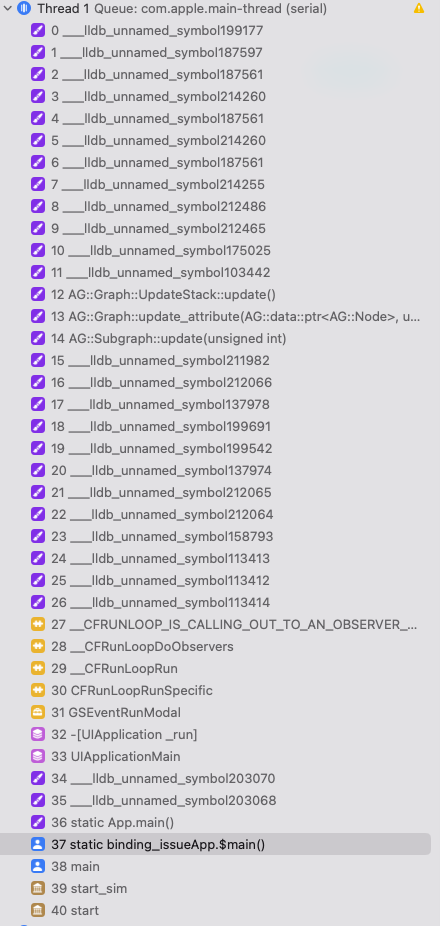I have a binding with optional String as a type and in the parent view I have if condition which checks whether it is has value or not. Depending on this condition I show or hide the child view. When I make name value nil the app is crashing, below you find code example.
class Model: ObservableObject {
@Published var name: String? = "name"
func makeNameNil() {
name = nil
}
}
struct ParentView: View {
@StateObject var viewModel = Model()
var nameBinding: Binding<String?> {
Binding {
viewModel.name
} set: { value in
viewModel.name = value
}
}
var body: some View {
VStack(alignment: .leading, spacing: 8) {
Text("Name is (viewModel.name ?? "nil")")
Button("Make name nil") {
viewModel.makeNameNil()
}
if let name = Binding(nameBinding) { /* looks like */
ChildView(selectedName: name) /* this causes the crash*/
}
}
.padding()
}
}
struct ChildView: View {
@Binding var selectedName: String
var body: some View {
VStack(alignment: .leading, spacing: 8) {
Text("Selected name: (selectedName)")
HStack {
Text("Edit:")
TextField("TF", text: $selectedName)
}
}
}
}
Here is stack of the crash.
Thread 1: EXC_BREAKPOINT (code=1, subcode=0x107e1745c)
AG::Graph::UpdateStack::update() ()
AG::Graph::update_attribute(AG::data::ptr<AG::Node>, unsigned int) ()
AG::Subgraph::update(unsigned int) ()
Looks like a switfui bug for me, should I avoid using such constructions?





3
Answers
Thanks to @workingdogsupportUkraine and @loremipsum for help to investigate the issue.
At the moment it looks like SwiftUI bug.
There are some workarounds using a default value which I'm not happy with because in case of complex data structure it can be annoying to create placeholder instance for such purpose. I prefer another approach where we convert
Binding<Optional<Value>>toOptional<Binding<Value>>.You could try this alternative approach to have a binding to your optional
name: String?.It uses
Binding<String>(...)as shown in the code. Works for me.EDIT-1
You can of course use this example of code, closer to your original code. Since
nameBindingis already a binding (modified now with String), havingif let name = Binding(nameBinding) ..., that is, a binding of a binding optional, is not correct.There is an undocumented method by Apple that allows you to see how, what, when SwiftUI
Views are loaded.If you add this to the
bodyof bothViewsYou will see something like
You will notice that the child is being redrawn before the parent.
So for a split second you are trying to set a non-
OptionalStringto anOptional<String>I would submit this as a bug report because Apple has addressed similar issues before in order to stabilize
Bindingbut to address your immediate issue I would use an optional binding solution from here or a combination of both.Or a little bit different set of solutions that combines the solutions from there
with the option above if
name == ""it will change toname == nilwith the option above if
name == ""it will stayname == ""andname == nilwill look likename == ""